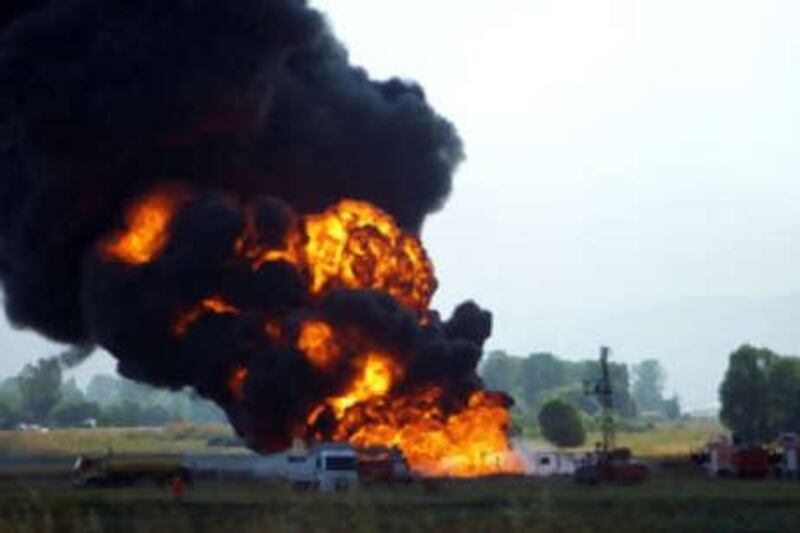A major conduit for Caspian oil exports to the West is under simultaneous threat from two regional conflicts, putting pressure on US aspirations to reduce "reliance" on Middle Eastern oil and Europe's desire to loosen Russian control over a large part of its energy supplies. On Saturday, Russian war planes staged a raid near the Baku-Tbilisi-Ceyhan (BTC) pipeline, the prime minister of Georgia, Lado Gurgenidze, said on national television. "Miraculously the pipeline was not damaged," he added. The bombing occurred during escalating violence over the breakaway South Ossetia region within Georgia, where the inhabitants mostly carry Russian passports. Some analysts suggest the Russian incursion into Georgia, ostensibly to defend its citizens in South Ossetia from a Georgian military attack, may in part have been motivated by a desire to reassert control over Azeri and Kazakh oil resources. The prolonged presence of Russian troops south of the Caucasus Mountains could allow Moscow to take control of the BTC pipeline, giving Moscow a lock on oil and gas exports from the Caspian region to Europe, as well as Central Asian oil exports to the US. The 1,774km BTC pipeline, operated by an international consortium led by BP, the British energy company, normally transports high-quality crude oil from the large Azeri-Chirag-Guneshli oilfield in the Caspian Sea through Azerbaijan, Georgia and Turkey to a deepwater terminal on the Mediterranean Sea. But it has been shut down since Tuesday due to a fire still burning in its Turkish section, and is expected to remain closed for at least another two weeks. The Kurdistan Workers' Party (PKK), which has been fighting for Kurdish self-rule in southern Turkey since 1984, has claimed responsibility for the explosion that started the fire. Ankara has downplayed the suggestion of PKK involvement, saying the fire may have been caused by a fault at a pump station. But the Kurdish rebels have threatened more attacks on economic targets in Turkey, indicating the strategic BTC pipeline could still be at risk of acts of sabotage. "Attacks on economic interests have a deterring effect [on Turkey] ? As long as the Turkish state insists on war, such acts will be naturally carried out," said Bahoz Erdal, a PKK commander. PKK fighters operating from bases in northern Iraq have previously disrupted oil flow through the Kirkuk-Ceyhan pipeline, which traverses southern Turkey. Further threats to the BTC line come from South Ossetian pro-Russian rebels, who could sabotage Georgian energy installations even if Russian troops withdraw, and from Russian-backed separatists from another Georgian province, who have threatened attacks on the pipeline if hostilities continue. Transit revenues from the pipeline are important to Georgia, which has no oil or gas production of its own. Recognising the existence of a high security risk from the outset, the BTC pipeline's owners - which also include the state oil companies of Azerbaijan and Turkey; the US oil producers, Chevron, ConocoPhillips and Hess; the European energy concerns, StatoilHydro, Eni and Total; and the Japanese companies, Itochu and Inpex - buried the pipeline for its entire length, contributing significantly to the project's US$3.6 billion (D13.2bn) construction cost. However, the BTC's eight pumping stations - two each in Azerbaijan and Georgia and four in Turkey - and its electricity supply are above ground. The BTC oil pipeline, with a capacity of 1.2 million barrels a day, is the world's second-longest, after Russia's Druzhba pipeline. It began transporting Azeri oil in May, 2005, and there are plans for it eventually to carry oil from the giant Kashagan oilfield being developed in the Caspian Sea, offshore Kazakhstan. Regional repercussions from any further attacks on the pipeline would extend beyond Georgia and Turkey, which also collects transit revenues from BTC. Azerbaijan could suffer severe damage to its economy, which recently has been booming due to oil and gas development and high energy prices. On Saturday, the country halted oil exports via the Georgian Black Sea ports of Batumi and Kulevi due to the hostilities between Russia and Georgia. Further afield, Europe and the US would see their energy security eroded. Indeed, Mikheil Saakashvili, the Georgian president, had mistakenly hoped for Nato to intervene on Georgia's behalf in its conflict with Russia, in order to protect the West's energy interests, analysts said. Both candidates in the ongoing US presidential race have recently stressed the issue of American dependence on foreign oil - especially Middle Eastern imports - in their election campaigns. However, it is doubtful that even a total loss of Central Asian oil imports would have much immediate effect on that situation. Last year, America imported 31 million barrels of Caspian oil, including 23 million barrels from Azerbaijan, reported the US government. Those oil shipments were greatly outnumbered by 790 million barrels imported from GCC states, and by even larger inflows from Canada and Mexico. @Email:tcarlisle@thenational.ae
Caspian oil exports under twin threat
A major conduit for Caspian oil to the West is simultaneously threatened by two separate regional conflicts.

Editor's picks
More from the national




